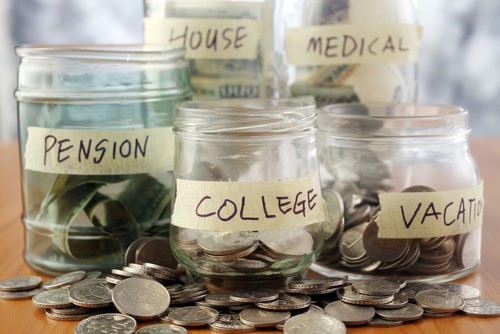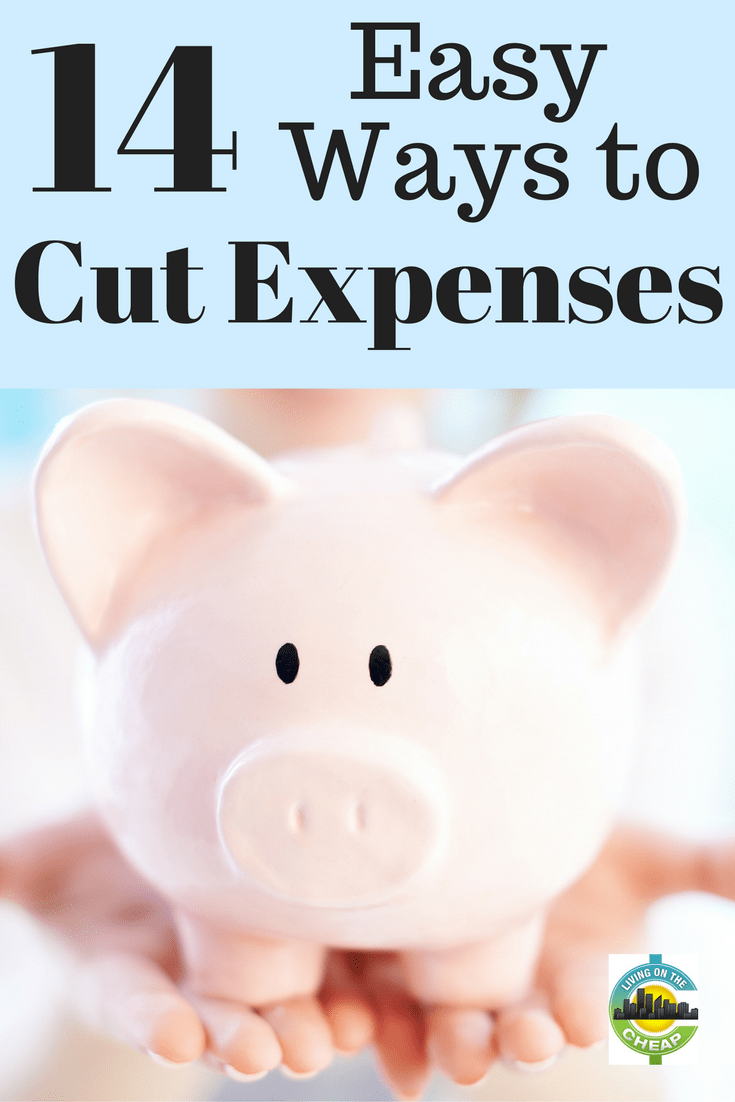It’s a new year, and that means it’s time to get your financial house in order. Learning how to cut expenses on the family budget can be a big help!
No matter what mistakes you made last year, you get a do-over this year. The beginning of the year is a great time to make changes that will boost your bottom line going forward. But before you can make a plan to save money, you have to find out where your money’s going. If you use an online budget tool or computer program to track your spending, run some reports and evaluate where your money went. If you don’t have any records, write down every penny you spend for a month.

“It’s hard to figure out where you’re overspending until you know where you’re spending,” says Jean Chatzky, author of “Money Rules: The Simple Path to Lifelong Security.”
Once you’ve got a record, do some analysis. The first question, obviously, is whether your outgoing funds exceeds your income. If you’ve got a mountain of credit card debt, and every month you spend more than you take in, you need make some changes.
Even if your expenses don’t exceed your income, drilling down into your spending may reveal places you can painlessly cut costs to have more money for retirement, a home down payment or an exotic vacation.
Your best spending plan may not be the best for your neighbor. We’ve all heard the cliché about cutting out the morning latte, but that isn’t going to work for everyone, especially those who never buy lattes. “If you value that takeout coffee – if it puts a little joy in your day – I don’t believe that’s what you should cut,” Chatzky says.
For some people, cutting out the morning latte won’t make a dent. They may have to look at more painful cuts, such as moving to cheaper housing or choosing public rather than private schools. “Sometimes the little trims here and there aren’t enough,” Chatzky says.
16 things you’ll regret not doing sooner to cut expenses:
Cook more at home. “We eat so frequently on the go these days,” Chatzky says. “The evidence is gone before you get home.” Anyone who can read can cook, and the Internet is full of websites with easy, healthy recipes. Use up the ingredients that are already hanging out in your pantry, refrigerator, and freezer.
If you are crunched for time in the evenings, use one of the weekend days to cook and freeze several meals for the month ahead. And put a stop on wasting food at home. It costs you the same amount of money to throw food away as it does to cook a nutritious meal.
Save on groceries by shopping store sales and using coupons. It’s true that a lot of coupons are for junk food, but that doesn’t mean you can’t save with coupons, particularly on personal care and cleaning products. Store sales can provide even bigger savings. Many products go on sale every two, three or six months. Watch the sales cycles on products you use, and stock up when prices are lowest.
Look for happy hours and restaurant deals. For many people, drinks and dinner with friends are a big part of socializing. If you don’t want to give that up but you want to spend less, find restaurants with 2-for-1 drinks and free or cheap appetizers and make those your dinner. Join restaurant email clubs to get coupons you can use to cut the price of restaurant meals. (See the latest restaurant deals and coupons here.)
Call your cable TV and Internet provider and ask for a better deal. As more users abandon cable and more competitors get into the market, companies want to hang on to customers. That means they’re ready to make a deal. You’ll get the best deals from the customer retention department, which is where you call to cancel.
“The last time I did this, I saved close to $50 a month,” says Liz Weston, author of “Deal with Your Debt: Free Yourself from What You Owe.” (Consider ways to cut out cable TV entirely.)
Investigate cheaper cellphone plans. Many carriers are offering new no-contract and pay-as-you-go plans. If you find a plan you like, and your contract is up, ask your existing carrier if it will match the price or give you a better deal. (Look at a comparison of cellphone family plans here.)
Use that cellphone to help you save money. Opt in to getting text and/or email alerts to remind you when a bill is due. There are also lots of great apps for managing all aspects of your budget and bill paying. Saving on those late fees (not to mention the hit your credit score could take) is a great way to get more bang for your smartphone buck.
Cancel your landline phone. Many people find they rarely make calls on their home phone. If you’re not using it, why are you paying for it? Ask about bundling your phone with your cable and Internet service – but be warned that a cable phone will not work in a power failure.
Review your insurance costs. Call your insurance agent and make sure you’re getting all the discounts to which you’re entitled. Make sure your coverage fits your current circumstances. If your teenage driver moved out and got his own car, get him off your policy. You might also want to get quotes from other companies on auto or home insurance.
Call your credit card companies and ask for lower rates. Or do balance transfers. Credit is loosening up and card companies are sending more offers. If you get a good offer, call your existing company and see if it will match the new offer. If your credit is good and you make all your payments on time, you’re in a good position to negotiate. “All they can do is say no,” Harzog says. “Consumers have more power than they know.”
If you are in debt, make a plan to pay it off. Paying $200 a month in interest charges is a waste of money that would be better used toward retirement savings, your kids’ braces or a trip around the world. Some experts advise paying off the smallest balances first, although Harzog recommends targeting those with the highest interest rates.
Either way, start paying off those cards, one at a time. Make the minimum payments on all cards, but target one card at a time and make bigger payments so you can pay it off. When you’ve paid off one card, go to the next.
Look for a cheaper health club. Are you paying $75 a month for a gym membership you never use? Maybe you should cancel and take up walking, biking or hiking. If you’re paying for a gym membership that you’re not using, why not use your smart phone to work out? You can use it as a pedometer with Map My Walk, get inspired to become a runner with a “Couch to 5K” program, or track your fitness goals with MyFitnessPal.
Many of these apps have a social networking aspect, too, so you get motivation from friends and new connections. Perhaps you can get a gym membership that’s equally good for half the price at a YMCA or community center. Shop around.

Look at the fees associated with your bank and investment accounts. If you don’t have free checking, ask your bank what you can do to get it. If your bank doesn’t offer free checking, find one that does.
If mutual fund fees or stock account fees are eating into your returns, move your accounts to a discount brokerage, especially if you’re not getting personalized advice.
Don’t shop for recreation. If you’re not in the stores, you won’t be tempted to buy. That goes for yard sales and thrift shops, too, Weston says. Ask yourself if you have a real need – or a want. If it is the latter, walk away and find a no-cost way to satisfy the craving.
Do your errands in a loop. Map out your errands ahead of time, and create a circular route to save money on gas.You can keep watch for the best deals on gas with the GasBuddy app, too.
Be careful of online purchases. It’s easy to shop online in the wee hours of the morning, but that spending can add up. Unsubscribe from email alerts that urge you to spend. Get yourself off stores’ online mailing lists and restrict your online shopping to things you really need, when you need them.
Make a budget and stick to it. Give yourself a realistic allowance for discretionary spending and don’t spend any more than that.
Use these tips to learn how to cut your spending!


What! A Budget…. LOL! I wish it were required in school to show young people how to do a budget and balance your bank accounts and such. Its good to know algebra and I’m glad they teach it, but life skills type math/ similar classes might serve most of us better.
When I was in high school, back in the dark ages, we were assigned to do a budget on a teacher’s salary as part of a religion class. It was challenging.
I am a senior on Social Security and I already follow most of these hints already. I would like to add that using household ingredients to make some cleaning supplies can save a lot (vinegar and baking soda can do a lot). I also take a number of prescription meds and went over the list with my doctor to see if there were any that could be found that so the same thing, but cost a little less. I was taking Nexium for acid reflux; he recommended Prilosec (OTC) and a little later on I found that I could get generic Omeprazole by prescription for even less. I also use store brands for things like Tylenol and aspirin (which I need to take). Overall, I’ve been able to cut my meds down by nearly 30%. And since I don’t drive to work anymore, I plan my shopping trips and other errands (using a list) so that I drive to the various stores in a circle to save a little on gas, rarely making duplicate trips in the same week. It helps to look at your spending for one year and keep track of it; yes, it’s tedious, but it keeps you aware of just where your money is going and where you can cut expenses.
Before you cut your landline make sure 911 can trace a call back to you in an emergency. If they’d known where to go my mother might still be alive.